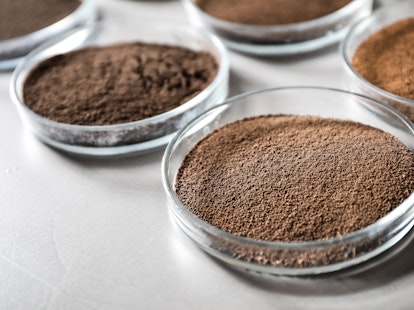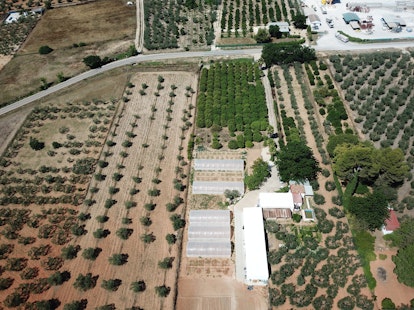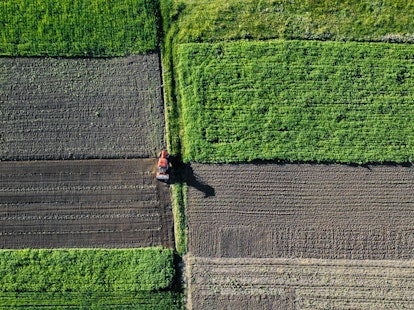Improve nitrogen uptake and crop yields with compatibility testing for microbial inoculants on treated seeds.
Seeds treated to improve germination and growth in difficult conditions offer farmers a more stable yield, even where the growing environment is not ideal. However, seed treatments can be highly complex, combining pesticides, biological treatments against seed and soil borne diseases, nutrients and biostimulants, dyeing agents, binders and film coatings.
Microbial inoculant efficacy
This chemical complexity has the potential to adversely impact microbial inoculants. As microbial active ingredients are biological in nature, there may be a conflict between chemicals and biologicals used on the same seed. For example, a chemical fungicide may harm an active biological ingredient – the microbial.
Compatibility testing addresses this issue. To assure its efficacy therefore, each microbial inoculant needs to be tested for compatibility with various registered chemical seed treatments.
Compatibility testing
Microbial active ingredients are applied using the following methods:
- Sequential application – applied to pre-treated seeds
- Reverse sequential application – applied to seeds prior to chemical treatments
- Simultaneous application – applied at the same time as chemical treatments
- Added as a tank mix
Once applied, compatibility testing analyzes the viability of the microbial inoculant over time and determines the number of colony forming units (CFU) at fixed time points, using shelf life experiments. Treated seeds are sampled and tested at the fixed time points.
This process requires analytical methods to determine the number of CFU both in the biological product before application and on the treated seeds. Shelf life experiments must be carried out in controlled conditions (e.g. temperature, humidity).
On completion, storage stability data is given for all the time points that CFU measurements were taken, and thresholds can be set for testing termination.
Shelf-life stability for microbial products can vary greatly, from hours and days, to more than a year, based on the treatment process, storage conditions, exposure to the chemical treatment and the impact of that treatment on the microbial.
SGS turnkey solution for seed treatment products
At SGS, we operate seed treatment facilities linked to microbial or chemical investigations. Our compatibility testing solutions investigate the homogeneity of treatments and doses, as well as conducting CFU count confirmation after treatment. Seed storage is all temperature and moisture controlled and shelf life is investigated by sampling and testing of treated seeds from storage.
In addition to compatibility testing we can also test the germination of treated seeds, as well as other endpoints, such as flowability and plantability.
An extensive field trial network across Europe, US and the world allows us to distribute seeds and perform testing in controlled growth chambers or R&D green house facilities, as well as under protected or open field conditions.
In France, and South Dakota (US) we have well established seed treatment facilities which provide GLP and non-GLP treatment services. Our turnkey service includes several analytically verified and certified methods and techniques, covering seed ordering, and including seed treatment and seed treatment application verification (STAV).
Compatibility testing for microbial products is supported by microbiological laboratory teams specialized in the handling of non-food microorganisms.
Our comprehensive range of solutions for the seed treatment industry includes:
- Purchase of seeds and reference products
- Treatment conducted in a dedicated room encompassing all necessary safety measures
- Treatment with liquid seed treatment formulations in dedicated treatment systems equipped for different bowl sizes (e.g. Wintersteiger HEGE II). Further solutions are established for larger seed batch sizes
- Application verification of active ingredient rate – conducted by our chemical and microbial laboratory network
- Determination of seed storage stability and shelf life under controlled conditions
- GLP Certificate of Analysis (CoA) as required – SGS labs are GLP certified
- Seed germination testing pre and post seed treatment in SGS growth chambers/greenhouses
- Dust–off (Heubach) test – on demand
- Flowability and plantability testing
- Comprehensive handling and shipment logistics (treated seed delivery to field stations) managed by our teams in France and the US
The development of a turnkey seed treatment service is part of SGS's commitment to providing comprehensive contract research services to the agricultural sector.
With a global network of laboratories and field stations, we have considerable experience in conducting GLP compliant field trials and laboratory analysis for the agricultural sector. Wherever you operate in the world, SGS is the first choice when finding the right agricultural contract service provider.
For more information, please contact:
Aurelie Triboire
Business Development Manager GEP Services
France
t: +33 6 33 25 16 97
Amanda Ver Helst
Laboratory Research Manager
US
t: +1 605 696 5526
About SGS
SGS is the world’s leading inspection, verification, testing and certification company. We are recognized as the global benchmark for quality and integrity. With more than 89,000 employees, we operate a network of more than 2,600 offices and laboratories around the world.



